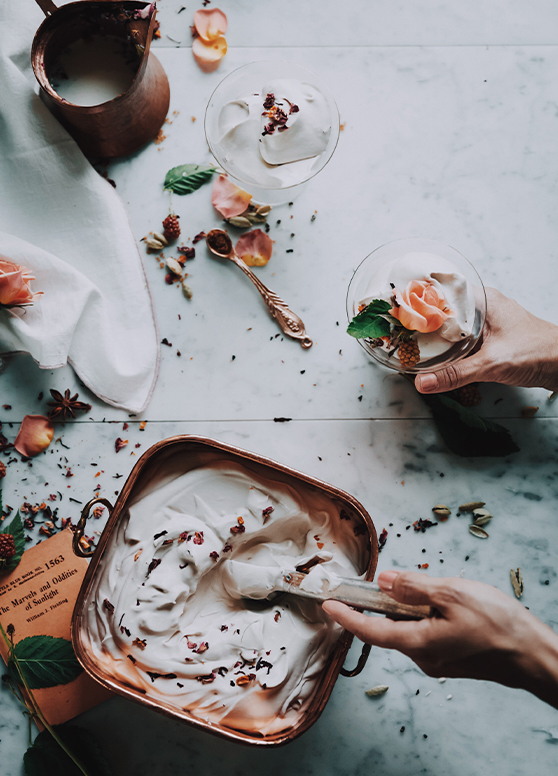
AUGUST 19, 2020 / Skincare
Say Bye to DIY Skincare

You can’t avoid the DIY skincare videos invading the web, whether it’s someone smearing papaya all over their face or treating a pimple with lemon juice. Skincare products are here for a reason, so leave the kitchen in the kitchen!

DIY Skincare Can Cause More Harm Than Good
It might seem like no big deal to put fruits or vegetables on your skin. If they’re good for your body, they must be good for your skin. WRONGO.
Foods applied topically on the skin have a very different effect from ingesting them.
There are many different compounds that make up one specific food. Many of these compounds can be irritating and leave the skin aggravated and inflamed.
Citric acid derived from citrus fruits, is often formulated in products at a low percentage. This is to adjust the PH of a product or to exfoliate lightly. Putting straight up citrus juices on your face can be incredibly irritating, even if you’re mixing it with Greek yogurt. It is in its most potent form and is not something you should be applying to your skin.
The acidity is too much for the skin to handle, and can impair your skin barrier leading to dryness, sensitivity, rosacea or acne flare up.
Papaya contains an enzyme called papain. This enzyme is extracted from the fruit and is sometimes found in skincare products.
To be frank, I don’t know why the heck anyone would be like, yes, we must have papain in our skin care formulation. Whether you’re using a papaya on your face for DIY or using it in a skincare product, it can be irritating and is not suitable for all skin types. Most importantly, there are no studies proving papaya does anything great for the skin.
Toothpaste on a pimple is another one that makes me cringe.
Toothpaste has chemicals in it not designed for your skin. Its PH is too alkaline, so using this as a spot treatment can dry out the skin too much causing irritation. Drying out the skin, can lead to worsening of issues. Salicylic acid, sulfur or benzoyl peroxide are much better options to clear your blemish.
Skincare Products Are Your Friend
Real talk, why the infatuation with DIY when there are amazing, safe to use skin care products on the market shown to improve skin issues.
Putting an avocado on your face isn’t going to be nearly as effective or perform as well as a PHA moisturizer or hydrating face mask with hyaluronic acid and peptides.
But if smearing an avocado on your face after a long day makes you happy, by all means…they’re pretty harmless on the skin. But it would be a lot better for you if you just ate it.
There is a reason why professionals recommend certain ingredients. If used properly and consistently, they actually work!
When is the last time your dermatologist turned around to you and said you know you should really step it up a notch with that lemon juice?
My point is, it’s not nearly as effective as your skin care products. Skin care formulations are designed to have all the goodies in one bottle. Amino acids, vitamins, antioxidants and so on, that actually penetrate the skin and help with your skin’s needs.

Harmless DIY Skincare
There are some DIY skincare masks that aren’t harmful. However, I would never recommend using these ingredients in place of serum or moisturizer.
Before I get into the DIY, I want to reiterate from my other blog post Clean Beauty Is Not Real that using DIY isn’t better for your skin because it is natural. There are many irritating compounds that are natural.
There are so many wonderful and safe skincare products out there. It is much safer to use a product formulated in a lab than putting things from nature onto your skin. You’re putting yourself at risk of irritation, allergic reactions and possible skin damage.
Manuka Honey and plain Greek yogurt are the only ingredients I would suggest if you are looking to do some DIY skincare for fun. Manuka honey is antibacterial, anti-inflammatory, has antioxidants, can be very soothing, and creates a thick film on the skin to help keep the skin hydrated.
Manuka honey must be produced and packaged in New Zealand. It is known to be superior to regular or light honey due to its helpful skin properties.
If you are dry or have some breakouts, using Manuka honey as a face mask can help rebalance and hydrate the skin, aid in healing the acne wound and keep it clean because of its anti-bacterial properties. It’s important to note acne is not always caused by the bacteria in the pore. Acne is triggered in many ways. It is safe to do and can potentially be beneficial to you.
If you are suffering from dryness, using a Manuka honey mask can help retain some moisture and soften skin cells.
Plain Greek yogurt is moisturizing and can potentially help those with acne due to the probiotics in the yogurt. You want to make sure the yogurt is plain and there are no fruits, or anything added. There is no real evidence proving probiotics applied topically work like they do when digested. Eating Greek yogurt is much better than applying it to your face. However, it is harmless and can be moisturizing.
With Love,
Nicole
Share It:
